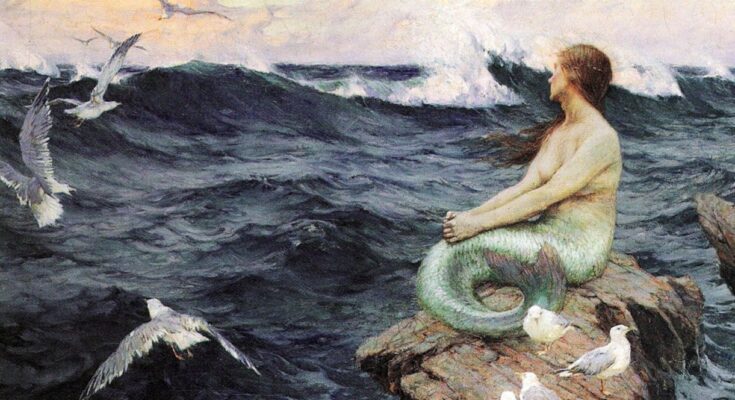Alexander the Great’s sister, Thessalonike of Macedon, was a remarkable figure. Outliving her half-brother, she would go on to become the queen of Macedon through marriage to one of Alexander’s generals, Cassander.
During his conquests, Alexander the Great named a myriad of cities after himself, and although his sister certainly did not enjoy the widespread fame of her conquering sibling, the second biggest city in Greece is named after her.
Perhaps the most intriguing detail about Thessalonike is the myth that spread in Greece after her death. A popular folk tale asserts that the Macedonian queen became an immortal mermaid who questions voyaging sailors. Give the right answer, and a peaceful voyage ensued, but to get it wrong assured destruction.
The early life of Alexander the Great’s sister
Born in 352 BC, Thessalonike was the daughter of King Philip II of Macedon and his wife or concubine, Nicesipolis. Her mother hailed from the Thessalian nobility, and the name “Thessalonike” was bestowed upon her in honor of Philip’s military victory over the Thessalians. According to the Byzantine scholar Stephanus, Nicesipolis died just 20 days after her daughter was born.
As a member of the Argead dynasty, Thesssalonike was born into a family that would shape the course of ancient history. Her most notable connection was her half-brother, Alexander the Great, who ascended to the throne following their father’s assassination. Alexander’s military campaigns and conquests brought him immense fame and power, making him one of history’s most prominent figures.
Thessalonike likely had interactions with her brother, although the extent and nature of their relationship remain uncertain. She was only about six or seven years old when Alexander left to campaign against the Persians and she was around 21 when he died.
The young princess appears to have been brought up by her stepmother and mother of Alexander, Olympias. Olympias was a Molossian princess from Epirus and married Phillip II in 357 BC to secure an alliance between the Molossians and Macedonians.
Queen of Macedon
Thessalonike played a significant role in the political landscape of ancient Macedon during the tumultuous years following Alexander’s death. Her later life encompassed her marriage to Cassander, her involvement in the governance of Macedon, the foundation of the city of Thessaloniki, and her eventual demise.
After the death of Alexander in 323 BC, a power struggle ensued among his generals, known as the Diadochi, to assert control over the vast empire he had built. Thessalonike was married to one of these generals, Cassander, who emerged as a prominent figure. As a sister of Alexander the Great, the marriage helped to solidify Cassander’s claim to power and legitimize his rule.
Thessalonike and Cassander had at least three children together: Philip IV of Macedon, Antipater I of Macedon, and Alexander V of Macedon. After Cassander died in 297 BC, it was left to Thessalonike to guide them towards ruling Macedon.
According to Kris Waldherr, “Thessalonike used the teachings of her wily stepmother to manipulate Philip, Antipater, and Alexander to her advantage. But the queen was no Olympias – death soon visited them all.”
Philip, Thessalonike’s eldest son, died from a disease, not long after becoming king of Macedon. He was succeeded by Antipater, but according to the Roman historian Justin, Thessalonike insisted that he rule alongside Alexander.
Historian Elizabeth Carney theorizes that Thessalonike made this insistence so that she could effectively co-rule through Alexander as regent. Whatever the case, this displeased Antipater and he murdered his own mother. Antipater was in turn assassinated by another challenger to the throne.
Interestingly, Thessalonike was not the only sister of Alexander the Great to have been murdered. His other two sisters, Cynane and Cleopatra were also murdered.
Mermaid legend
The legend tells of Alexander the Great’s pursuit of the Fountain of Immortality, which led him to acquire a flask containing immortal water through great efforts. Variations of the tale suggest that Alexander either used the water to wash his sister’s hair, granting her immortality or inadvertently used it to nourish a wild onion plant, failing to inform Thessalonike of its contents.
Following Alexander the Great’s demise, his sister, consumed by grief, sought to end her life by plunging into the sea. However, instead of meeting a watery fate, she transformed into a mermaid, destined to pass judgment on mariners across countless centuries and the vast expanse of the seven seas.
Every encounter with sailors bore a consistent query: “Is King Alexander alive?” (Greek: Ζει ο βασιλιάς Αλέξανδρος;). Only the correct response of “He lives and reigns and conquers the world” (Greek: Ζει και βασιλεύει, και τον κόσμο κυριεύει!) would appease her, allowing the ship and its crew to sail away safely on tranquil waters. Any other reply would awaken her wrathful Gorgon form, determined to send the vessel and its sailors to the depths below.



